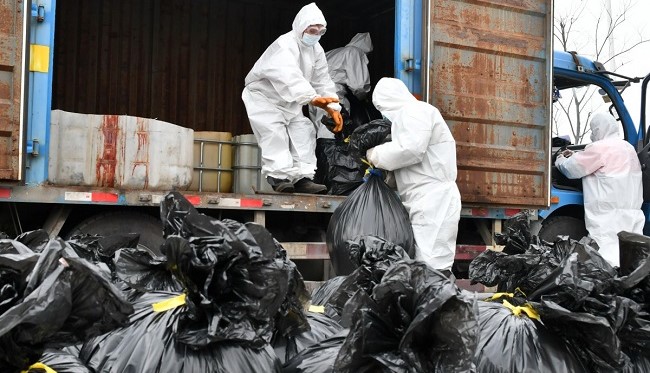In Nigeria, wastes are dumped in open pits; flowing gully water, drainage channels and poorly managed landfills, which have become very rigorous to maintain, and where waste pickers without wearing proper PPEs would scavenge for recycled materials.

Such landfills also serve as a “food bank” for livestock such as dogs and goats, which can roam about in Nigeria. Such acts may expose humans and livestock to diseases (including Covid-19), exacerbating their spread. It was reported that following the interment of a Covid-19 patient at the Gudu Cemetery in Abuja, a Mortician dumped his disposable safety coverall in a public space. The Public Health Department had to intervene to decontaminate the space. This is an example where poor waste management of contaminated PPEs may increase the spread of the viral disease.
A recent research conducted by Stewards of the Environment for Sustainable Change Initiative (SESCI)/Stop Don’t Drop, an Abuja-based NGO, which is the first report on micro-plastics in sediments and water from a fresh water body dam in Nigeria, reported that micro-plastics, medical wastes and pharmaceuticals were found in water and sediment of Usuma Dam, the major source of portable water for residents of the Federal Capital Territory in Abuja, Nigeria. It is therefore pertinent to ensure that there is effective waste management of Covid-19 waste, so they do not end up in our waterways and water bodies.
Improper disposal or disinfection of plastic bottles used for packaging drinks and water sold in healthcare facilities and isolation centres may be another potential source of viral disease, the used bottles may be contaminated with the virus, and however, disposed/used bottles are often sourced and reused to package locally made drinks and herbal medicines that are sold across the country. Such reuse of contaminated plastic bottles would certainly increase the spread of viral diseases.
The issue of low collection, coverage, and irregular collection services has pushed most households to rely on young boys for the collection and disposal of their waste. In some cases, the waste is not effectively managed, and these boys are constantly exposed to health risks.
Until recently, Nigerians have not been particularly concerned about waste management, open dumping and open burning in unapproved locations has been the norms. Poor waste management practice in Nigeria is not limited to lack of policy or laws, but poor infrastructure, education, social awareness of problems and solutions, and lack of institutions promoting sustainable environmental actions.
Even though the implementation of government policies on waste management in Nigeria is an arduous task, there is the need for more efforts to be put in, concerning the management of Covid-19 waste. The grass root mobilisation of communities and local governments is very essential in this regard, because adequate public orientation will change the attitudes of people in realising that effective waste management, especially Covid-19 waste, is not the responsibility of the government alone.
As a way forward, the following recommendations are made:
- There is need to create awareness through environmental and public health education on the dangers of poor waste management in Nigeria.
- Provision of adequate and well trained sanitary and health workers to meet the challenge of poor waste management and supply efficient equipment and facilities, to achieve maximum output.
- There must be constant monitoring and enforcement of regulations, which will ensure that rules are adhered to and strict penalties for offenders.
- Government should encourage Public-Private Partnership, to invigorate community participation in waste management in Nigeria.
- There is also the need for strong regulations to be put in place for effective waste management in Nigeria.
By Aisha Agyeno (Researcher and Programmes Assist at Stewards of the Environment for Sustainable Change Initiative (SESCI)/Stop Don’t Drop; aishaagyeno@gmail.com)
